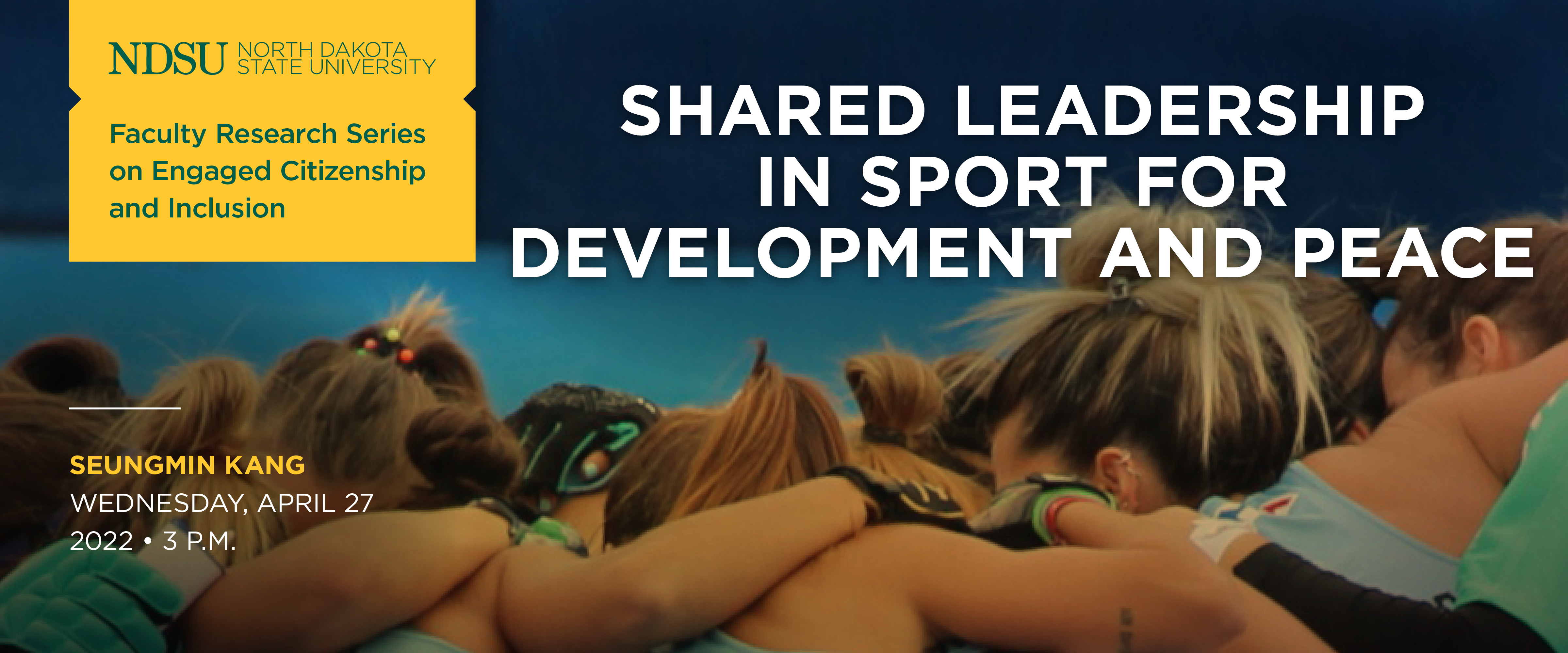
View Archived Presentation Here
Abstract: Sport for Development and Peace (SDP) organizations utilize sport as a tool to address broad social issues, which has brought attention from diverse organizations including, but not limited to international/national governing bodies, sport federations, for-profits, and nonprofits for engaging in multi-organizational collaborations. However, the complex environmental factors and internal capacity challenges surrounding SDP organizations put additional pressure on leaders who are required to balance multiple organizational demands to achieve broad social change outcomes as well as the sustainability of the SDP collaborations. This presentation introduces how collaborative leadership approach characterized as shared leadership can help achieve the sustainability of SDP organizations by sharing recent research.
Seungmin Kang is an Assistant Professor of Sport Management in NDSU's Health, Nutrition, and Exercise Sciences Department. His research investigates how nonprofit sport organizations serving as the catalysts for social change can better achieve their desired outcomes contributing to United Nations’ (UN) Sustainable Development Goals (SDGs). Dr. Kang utilizes leadership and human resource development (LHRD) theories as conceptual frameworks to help contribute to the long-term sustainability of SDP organizations. Dr. Kang’s research has been published in academic journals including the Journal of Sport Management, Sport Management Review, Managing Sport and Leisure, and Journal of Sport for Development. His research has also received recognition by European Association for Sport Management, Asian Association for Sport Management, Korean American Association for Sport Management, and American Kinesiology Association. He received his doctoral degree from the Louisiana State University.
By Dr. Kang
A broad range of organizations are involved in the field of Sport for Development and Peace (SDP). The complex environmental factors and internal capacity challenges surrounding SDP organizations put additional pressures on SDP managers who are required to balance multiple organizational demands to achieve sustainable program outcomes. Although scholars have begun to explore managerial aspects of SDP efforts, literature on the nature of leadership in SDP remains scarce. In this article, therefore, the authors introduce the concept of shared leadership and arguments for why considering leadership as a collective phenomenon is of particular value in SDP. Specifically, a conceptual framework is developed to identify antecedents and outcomes of shared leadership in SDP. Nine propositions are presented along with a discussion of future areas of study regarding shared leadership in efforts to use sport as a means for achieving development and peace-building outcomes. Limitations of this leadership perspective are also outlined.
The Influence of Servant Leadership on Shared Leadership Development in Sport for Development
Leadership is critical to the success of sport for development (SFD) organizations that operate in environments characterized by limited resources, growing competition, and blurred institutional boundaries. Previous research has primarily explored the efficacy of different leadership styles within SFD contexts and examined how leadership contributes to key dimensions of organizational capacity, performance, and other related concepts. Servant leadership and shared leadership have emerged as two particularly viable frameworks, yet there remains limited knowledge of how these approaches are developed and related in SFD. The current study is based on surveys from 100 employees of SFD organizations and utilized regression analysis to examine the relationship between salient organizational factors, servant leadership, and shared leadership. Results indicate that after controlling for salient organizational factors, servant leadership explains a significant portion of the variance in shared leadership. The discussion focuses on the theoretical and practical implications of these findings and highlights key areas for future research.
Open Access Journal
Journal of Sport for Development
The Journal’s mission is to advance, examine, and disseminate evidence and best practices for programs and interventions that use sport to promote development, health and/or peace.
Open Access Ebooks
Sport for Development and Peace: A Critical Sociology
The role of sport in development initiatives has grown dramatically over the last five years, now finding a place in the UN's millennium development goals. In Sport and Development for Peace, Simon Darnell outlines the most recent sociological research on the role of sport in development initiatives.
Chapter: Sport for Development and Peace: Current Perspectives of Research
Sport for Development and Peace (SDP) is an international movement that began in the 2000s with the Millennium Development Goals (2000–2015) and is currently continuing around the United Nations’ Sustainable Development Goals 2015–2030, driven by international organizations such as UNESCO. Often located in an international development context, organizations and associations use sport as a vehicle to reach several social and humanitarian missions. This chapter presents the origins and objectives of the SDP, but it also looks at current research in the field.
Reports
Sportanddev.org: What is Sport for Development and Peace?
Sports Think Tank: Introduction to Sport for Development and Peace
Organizations
UN: Sport for Development and Peace
News
The Conversation: How Sport for Development and Peace Can Transform the Lives of Youth
